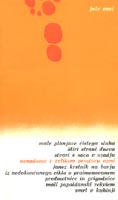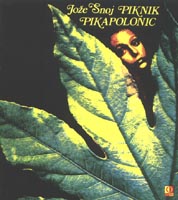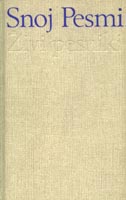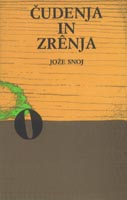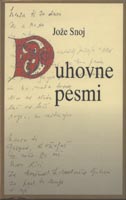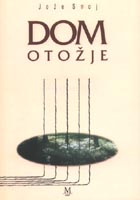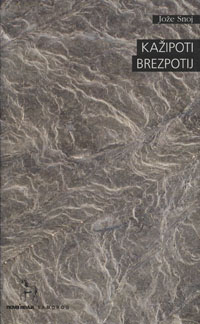


(Click on the picture to enlarge it)
|
|
The Mill of Hundred Eyes Snoj's first book of poetry was printed nearly half a decade after the time when communist authorities forbade the printing of its precursor, which author intended to publish by himself. Later he was expressing his distress in the suffocating ideological-political environment with even more veiled modern metaphor, based upon paradox; it was the revolt against regime socialist-realistic versifications as well as against belated naive romanticism. "The hundred-eyes' mill" - the mill wheel, all of eyes, blinded of secrets of existence - is a metaphor for author's continually turning round in experiencing eroticism, nature, religion and revolution. The title for the whole collection - in which we can already find all the mentioned themes, also in lyric-epic cycles - gave the title of one poem. |
|
|
The Cavalry of Slovene Hoplites The collection represents a break in formal
and subject matter. Here begins the process of reducing the centrifugally
exuberant and aestheticistically autonomic metaphoric to only one big
metaphor, which is the poem in whole, respectively to the poem's
"poetical skeleton" as the reduced lyrical structure of newly
beheld and pointed connections between things and phenomena of the world. The
author omits punctuation marks, so that the words - in some cases already taken
to syllables - as meaningful, sound and rhythmic carriers of metaphorically
associated realities "stick together" more easily. The author
evokes Christ from the human Christlike duality and he evokes the Christly
tortured and concealed victims of revolution from the abysses of Rog and
elsewhere. Those victims are - in the
self-deceit of fratricidal ideological fight on both sides - the
"hoplites /infantrymen" who will never become "cavalry".
When the author is experiencing the growth of his son, he is shocked by the
destiny of youngsters, fallen or killed in revolution, deprived of ever being
fathers. |
|
|
|
|
Suddenly in a Vast Space Alone The existential solitude is growing; the
author is close to flirting with Nothing (Nihil). All of a sudden, it runs
through his head with a horrible clearness, that he is all alone in a large
place. This vast space comprises things and phenomena of the world, which
surround him and devour him. His sudden fear has not only big but also
piercing eyes. Phenomena and things, apparently just the descriptions of
realities, are full of hints at over sensual, ontological secrets, of which
the death there in the rear is the most exciting. This gradual recovering
consciousness is intensified also by the revolt against a more and more
superficial consumer society. Therefore, he throws to this society - but no
less to himself, too - the Christ, insulted with a new incomprehension. |
|
|
Ballads for Voice and Rattles Under the glaze of good order and increasing comfort, the Slovene society is dying spiritually. For this society, not only the concealed victims of revolution are dead, but also their executioners - under the protection of taboos - are psychically and physically passing away. Not all, of course; therefore one must have courage to whirl the rattle and to elevate the voice to wake the society from its rotten peace. Behind the courage, there must be consciousness and behind it, there must be faith. The author calls those powers in himself from the Christly suffering of a human being. From its senselessness, the core of an inconceivable sense is starting to condense. The ballads are the "portraits" of the actors of revolution - especially of the winners, painted over with worthiness and civil integrity, on the background of the anonymous vanquished. The ballads interweave the diabolic and the tragic. |
|
|
|
|
The Picnic of Ladybirds The picnic means a highly sybaritic splendor and the swarming of lovely dotted ladybirds signifies the human blind lust for the pleasures of life. At first sight, the title is one-way moralistic considering the author's (self) criticism of overwhelming consumpting and so sexual insatiety. In fact, this diary - narrated mostly in third person objectivity - of erotic experiences is the author's torn protest against the original dichotomy of sensual beauty and pleasure, as well as the worm of decay in it. He does not want - especially not in favor of conventions - to renounce the body, but at the same time, he cannot overhear the warning ticking of death's transitoriness in it. The author experiences the erotic ecstasy of spirit as an absurd punishment for the unrequested gift of life. In this collection, he is in his pagan vitality more than ever at the edge of only-nothing, nihilism. |
|
|
Lilac Aquarelles Eroticism and nature, religion and history - all those subjects and their emotional accompaniments come together in this collection in an ocean of language. They remain in it, but dissolved; in the glitter of the ocean's murmur, waving and visual reflection of the world they become translucently "aquarelized". Every rare and sparingly chosen word, illuminated with the world's ontological profundity in Lilac Aquarelles is therefore by itself a poem; tune, rhythm, image and meaning are already in the syllables and sounds that make a poem. Moreover, how soundfull and meaningful becomes this language when everything is reflecting and singing in-between everything! The lilac color of those twinkling spectacles comes from the mystic azure light of the "hundred eyed mill". We hear beautiful celestial melodiousness of language above the abysmal horror of the existence. We feel pure joy of writing poesy as the key for this soothing esthetic hermetism. |
|
|
|
|
Poems Selection of some of the author's poems. |
|
|
Elegies for Father and Fatherland This is the most social critical collection but at the same time also the one, which resorts most to the privacy of two, who retire from the "picnic of the ladybirds". The author's father dies, father who is the bearer of the tradition of fatherland; fatherland is located in Spirit, homeland is only a dear experience of domestic land. He is afraid that Slovenia is dying right in front of his eyes; he sees Slovenia with its brain terrified by Bolsheviks, brain-washed by consumerism, living under the increasing shadow of the Balkans. With a growing need for God - as we say will for God - and with the faith in fireside (home) kept up in the lap of beloved woman, he is overcoming black misgivings in the midst of this symbolical Siberian winter, lasting with no end visible; he is giving himself way with a challenging hope and caustic satire. Fortunately those evil predictions - maybe only postponed? - were unfulfilled. |
|
|
|
|
Wonderments and Stares Experiencing the mountain, namely Mozirska
with a symbolic mountain in the background, the author in new metaphors opens
and renews the ontology of God’s nihilism as "the eternal returning of
the same". This collection is psychologically and techno-poetically more
determinable in the way he is trying to get upon this ontology's track.
Namely, he intensifies his wonderment toward the world by looking about and
staring at it. The mingling of those states turns him round in the
circulation of things and phenomena in the "hundred-eyed" center of
which - "the mill" is turning on! - the torment of moving thickens
to the immobility of void that is bringing peace. Between him - in whom the
universe has opened its eyes - and the blindly staring gnome of the nature at
the bottom of his eyes there lies the awakening, never really awakened, of
the Nothing as All. And this wonderful All (sun, moon, earth as planet and as
one of "four elements" from which comes everything that grows and
furthermore "men, animals and gods") elicits from him the admiring
hymnic tones. |
|
|
Spiritual Poems The ambivalent Nihil of All/All of Nihil informs in the collection that is a praise of life - an ode demands the addresser! - its precise name and mythology. This name is "The Lord that gives life", the Christian Holy Spirit, the personalized Word, that created (with words) the world. The language/poetry is a signpost to this secret. The author is paradigmatically announcing this secret in his own child while experiencing the becoming aware of a baby; a child is creating this world anew all the time, when he is learning to name it out of his original spiritual memory. The author's own fatal story and, on the other hand, bitter Bethlehem story mix up - now he is the almighty heaven's Father to his earthly son and now he is holding the God's son, who is bound for Calvary, in his fragile earthly lap. This pastoral full of love is therefore not idyllic. In its ontological heart is still an unknown and enormous tension: God is hunter and man is prey, they need each other to be able to see and to re-establish each other in delight and torment of existence. They need each other's sympathy as the source of never comforted cosmic love. |
|
|
|
|
Home/sickness The title word "homesickness" written as Home/sickness is graphically pointing out to us two feelings that enlighten each other: both emotions were commanding the author during the breaking historical moment of the 1990s in which this collection was written. As soon as his patriotic sentiment was fulfilled with the independence of Slovenia, inside his self - as there is always grief of appeasement that comes as a pay for what was gained - there emerges nostalgia for his childhood home, which is gone forever. For him this home was and remains valuable because it was maintained between the tremors of mortal fear and hopes of survival in the homelessness of the Second World War and revolution. The collection - "curriculum vitae in verses" - means with this central optics a lyrical parallel to the author's novel Gallows Hill, written already ten years before, when he epically represented the tragedy of fraternal bloodshed through the eyes of a child. His reconciling "hommage to Slovenia" that concludes the collection, evokes images of Ljubljana, which consoled him after horrors of revolution. |
|
Under the Sky of Seasons The lyrical theme of this author's most extensive collection, written after the concluding (in subject, motives and expression) novel Mister Pepi, is nature. In appearance, the firmament is "covered" with climate, with rotation of the seasons above the author's dearly beloved places and landscapes; it is also "covered" with under/sky as the scene of everything that happens between heaven and earth - as at the amalgamate "sky" of visible and invisible - inside the man, in his spiritual "climate". The lyrisation of those runaway moments of beauty flows from the outside to the inside, from impression to the print of the soul, from - let us simplify - impression to ontology. Therefore, those poems as metaphors of natural phenomena do not want to be old romantic illustrations of poetical sensations given in advance, but such autonomous and self-standing cuts in the colossus of nature which raise those sensations when the intarsia of the nature's ontological secret shows in the cross-sections. Those "onto impressions" are author's hommage to Slovenia. |
|
|
|
The Painting of the Inside When that (the thing) that is nothing, so that it can BE, becomes a Person - while Hunter and Prey in the author do not cease to prove interdependence - and while the hunting is going on - this Person inevitably gets also his distinguished Face like Man. This Face in the collection is Christ, the God incarnate. The human alikeness testifies the Godlikeness with suffering and with death at the cross. The soul stirring hymns to the unseen sense of this absurd, the absurdity of the Cross, get their Lord's house - the Christian mythology. The poems of Christ's stations with the peak in Passion are the "frescoes" on the walls of the temple - the painting of the inside. The "portraits" of his partakers - from John the Baptist to Judas Iscariot and Pontius Pilate - try to illumine the Christ's superhuman martyrdom figure. At the last "fresco", the author/painter represents himself in the figure of doubting Thomas. |
|
|
The Waymarks of Nowheres There is nearly half a century between the first (The Mill of Hundred Eyes) and last (The Waymarks of Nowheres) collection of poems. In this time the author expands and analyses subjects and motifs in his lyrical triad circle of nature – man – God / God – man – nature. The author has been trying to express these central poetical items more and more clear and condensed. The metaphor "blue light" for the human enlightment with the Spirit appears already in the poem "Endless Ocean, Endless Islands" of the first collection and is then repeated in the paraphrase of Murn's "Winter" at the end of "Waymarks of Nowheres". This collection is namely dedicated to Josip Murn; the author wrote about him in several essays as "the father of modern slovene poetry", which is in its contents founded on philosophical absurd and in its expression based on verbal paradox. The metaphor in the title indicates a "directed indirection" of poetry. |
|
|
Back |



